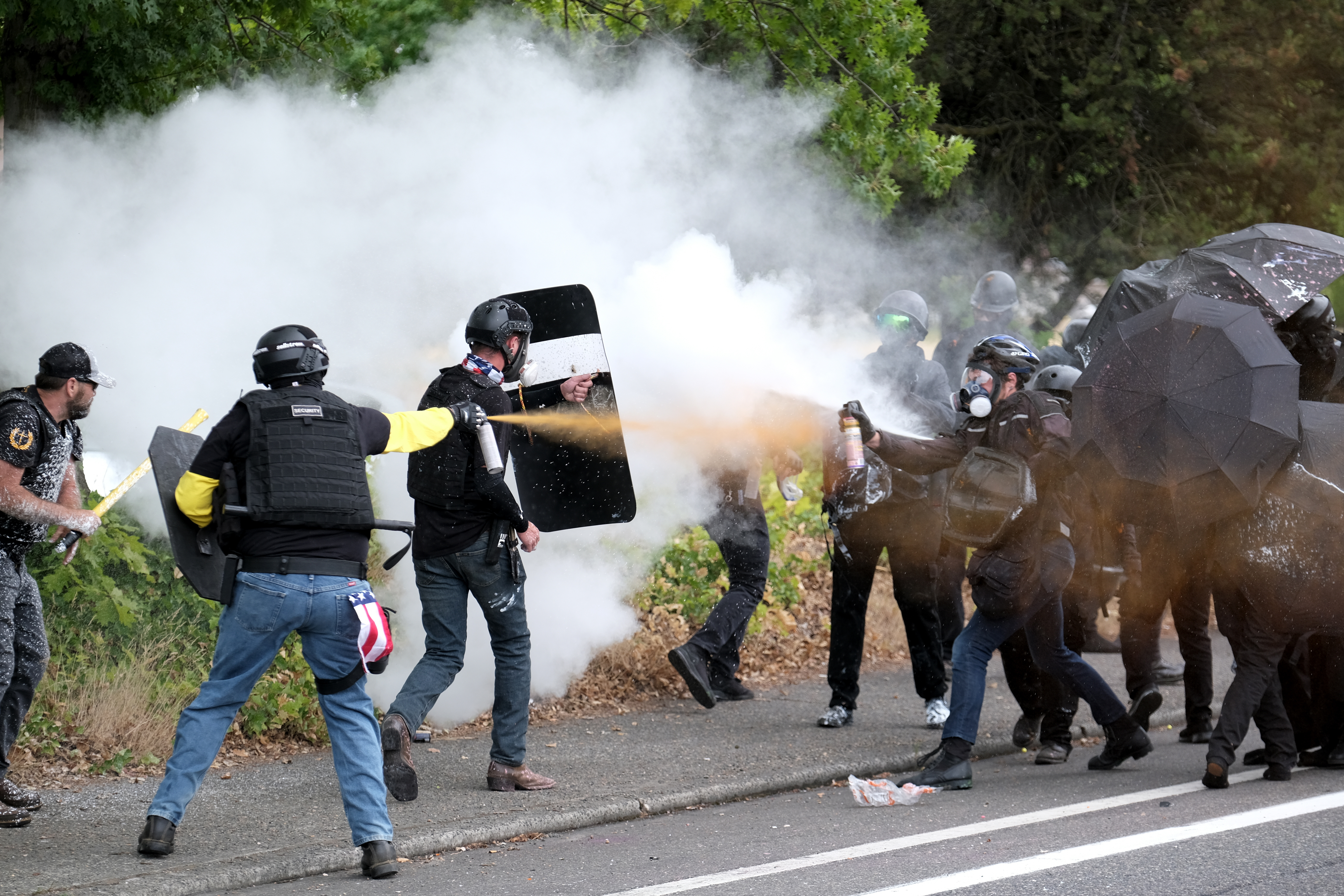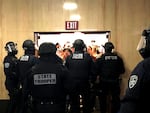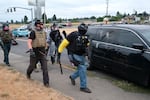
In this photo from August 2021, members of the far-right group Proud Boys and anti-fascist protesters spray bear mace at each other during clashes between the politically opposed groups in Portland, Ore.
Alex Milan Tracy / AP
Oregon lawmakers are considering legislation that would give the state some of the strongest laws in the country to combat paramilitary activity and violent extremism.
During a hearing in Salem on Monday, the House Judiciary Committee heard testimony on House Bill 2572. The legislation attempts to uphold constitutional protections such as the right to protest and carry firearms while more actively protecting public safety. If the bill were to pass, Oregon would have the most updated, comprehensive, and arguably most effective law in the country to address private paramilitaries.
“House Bill 2572 would make it harder for private paramilitaries to operate with impunity through Oregon, regardless of their ideology,” said Rep. Dacia Grayber, a Democrat who represents southwest Portland and Beaverton and is the chief sponsor of the legislation. “I do believe that this bill has the potential to create a relief valve ahead of what could be an increasingly violent political election cycle and keep our state from descending into further cycles of violence and chaos.”
The bill does not contain additional restrictions on firearms.
“This is not a gun bill,” Grayber said. “This does not infringe on the rights of individuals to open carry, nor does it limit your Second Amendment rights.”
For 40 years, state law has made it illegal to engage in paramilitary activity, such as creating and maintaining private militias. But state law enforcement leaders say the current statute is so convoluted it’s been used just a handful of times since the legislature passed it in 1983.

Dueling demonstrations gather in downtown Portland, Ore., Saturday, Aug. 22, 2020. Groups like Proud Boys and Patriot Prayer showed up downtown to oppose monthslong demonstrations against systemic racism and police brutality.
Jonathan Levinson / OPB
“Attempts to prosecute the crime of unlawful paramilitary activity in Oregon are almost, well, they’re nearly non-existent,” Kimberly McCullough, legislative director for the Oregon Department of Justice, testified during a public hearing on Monday before the House Judiciary Committee. The state’s current law, she said, has “proven insufficient to properly address paramilitary activity.”
The Pacific Northwest has long been a hotbed for violent extremism. And in recent years, Oregon has often led the way.
In 2016, armed, anti-government extremists took over the Malheur National Wildlife Refuge for 41 days in a stand-off that ended with one leader dead and the others arrested. In 2017, far-right groups such as the Proud Boys and Patriot Prayer began holding rallies in Portland that were met with counter-protesters and frequently descended into violence. In 2020, months of largely peaceful racial justice protests eventually gave way to property destruction at the hands of anarchists in black bloc. During that summer, a self-described supporter of antifa shot and killed a protester on the far right. Weeks before the Jan. 6 attack on the U.S. Capitol, protesters broke into the Oregon State House, which was closed to the public due to COVID-19 restrictions. Some of those who showed up at the State House in Salem went on to storm the halls of Congress in Washington, D.C.

Police block an entryway to the Oregon Capitol as far-right protesters attempt to gain access on Dec. 21, 2020.
Dirk VanderHart
The proposed bill defines paramilitary activity and the specific acts that constitute a crime. A person must be “acting as part of a private paramilitary organization” and “armed with a firearm, explosive or other dangerous weapon” while interrupting governmental proceedings, engaging in public patrols, or intimidating another person, to name just a few activities the bill states are unlawful.
The legislation also provides new tools aimed at preventing paramilitary activity by providing the attorney general – or any individual injured by paramilitary activity – the ability to seek a court injunction by filing a lawsuit.
Multnomah County District Attorney Mike Schmidt, who testified in favor of the bill, said the 2020 protests illustrated the limitations of current law to stop the violence before it started.
“Many of these acts of violence are forecasted in advance,” Schmidt said. “When it can be demonstrated that this violence is pending, our Attorney General can step into the breach and protect Oregon citizens from harm before it happens.”
HB 2572 was crafted with the help of Mary McCord, a national expert on terrorism and domestic extremism. Until 2017, she served as a top national security official at the U.S. Department of Justice.
While the Second Amendment allows for a “well regulated Militia, being necessary to the security of a free State,” McCord testified during Monday’s hearing that “‘regulated militia’ always has meant regulated by the government” and used for the protection of the state. Today, those militias are better known as the National Guard, she said.
“Private paramilitary activity is not authorized under federal or state law,” McCord told lawmakers. “It’s not protected by the Second Amendment. The Supreme Court has been clear … It’s unlawful in all 50 states, including Oregon.”
McCord runs the Institute for Constitutional Advocacy and Protection at Georgetown University Law Center and has successfully used civil litigation similar to the bill being proposed in Oregon to stop paramilitary groups in New Mexico and Virginia.

In this photo from August 2021, members of the far-right group Proud Boys surround a car they believe is driven by anti-fascist counter-protesters during clashes between the politically opposed groups in Portland, Ore.
Alex Milan Tracy / AP
Even when existing laws have been enough to shut down paramilitary activity, success has been in part due to attorneys operating in extreme cases that have made long ago court rulings and outdated laws relevant.
Oregon’s proposed legislation could serve as a roadmap for the nation. More limited legislative proposals have been discussed in Montana and Vermont, according to McCord. She said she’s had private conversations with lawmakers from across the political spectrum in other states who are also interested in similar legislation.
McCord said she’s also worked with lawmakers in Washington state. House Bill 1333 would establish a commission on domestic violent extremism. A draft of a bill states commissioners would identify ways to “combat disinformation and misinformation, address early signs of radicalization” and examine “current legal tools, both civil and criminal,” and recommend new ways “to address domestic violent extremism.”
During Monday’s hearing in Salem, no one testified in opposition to HB 2572. Though there were many who submitted written testimony opposing the bill.
BJ Soper, of Redmond, a founder of the Pacific Patriot Network involved in the refuge occupation in Harney County, submitted testimony opposing the legislation.
“This bill is not designed for the protection of the people, it is designed to protect the government from the people giving yet another avenue to abusive and subjective prosecution,” writes Soper. “To predetermine and make it a felony for people to come together to plan and train for common defense, like I said above, is the tool of a tyrant.”

A police officer steps in between BJ Soper (blue plaid shirt and black jacket), of the Pacific Patriots Network, and counter-protesters in Burns, Oregon.
Amelia Templeton / OPB
The Oregon Firearms Federation’s Kevin Starrett said the bill needed to include more protections for private security.
That’s despite a legal opinion offered by legislative counsel and emailed to Starrett by Rep. James Hieb, R - Canby, that says private security firms would only be considered paramilitary organizations were they to engage in civil disorder with the intent to “unlawfully employ” a firearm or other weapon. The email, which OPB reviewed, was sent on Feb. 4, two days before the hearing.
Hieb confirmed that he sent the email to get an answer to Starrett’s question. Starrett is one of Hieb’s constituents.
Hieb said he’s still studying the bill. “It could be problematic,” he said.
Like the original statute, House Bill 2572 has numerous exemptions, including one for authorized private security firms. There are also exemptions for self-defense clinics, firearms safety and training facilities and historical reenactments, among others.
Starrett also opposed a section of the bill that defines “private paramilitary organizations” as “three or more persons associating under a command structure.”
When Oregon lawmakers initially passed the state’s paramilitary law decades ago, it had the support of the National Rifle Association, the Oregon Rifle and Pistol Association, law enforcement groups and the Urban League of Portland, among others.
This time, at least so far, the main supporters are part of the law enforcement community.
“We have landed on a policy that I believe is the most constitutionally sound and focused approach to preventing the most egregious cases of political intimidation and violence, and hits at the core of what will prevent the next Charlottesville or January 6th,” Grayber said.
Correction: This story has been updated to reflect the correct spelling of Rep. Dacia Grayber’s last name.


